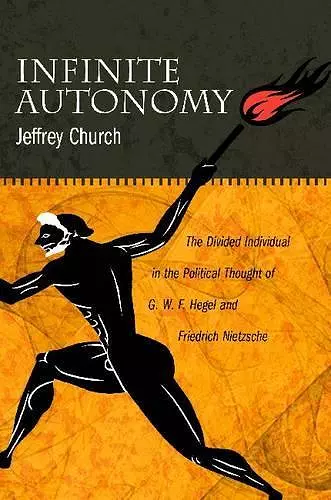Infinite Autonomy
The Divided Individual in the Political Thought of G. W. F. Hegel and Friedrich Nietzsche
Format:Hardback
Publisher:Pennsylvania State University Press
Published:15th Dec '11
Currently unavailable, and unfortunately no date known when it will be back
This hardback is available in another edition too:
- Paperback£31.95(9780271050768)

G. W. F. Hegel and Friedrich Nietzsche are often considered the philosophical antipodes of the nineteenth century. In Infinite Autonomy, Jeffrey Church draws on the thinking of both Hegel and Nietzsche to assess the modern Western defense of individuality—to consider whether we were right to reject the ancient model of community above the individual. The theoretical and practical implications of this project are important, because the proper defense of the individual allows for the survival of modern liberal institutions in the face of non-Western critics who value communal goals at the expense of individual rights. By drawing from Hegelian and Nietzschean ideas of autonomy, Church finds a third way for the individual—what he calls the “historical individual,” which goes beyond the disagreements of the ancients and the moderns while nonetheless incorporating their distinctive contributions.
“Hegel and Nietzsche have commonly been viewed as philosophical opposites. In his important new book, Jeffrey Church convincingly shows that these two thinkers in fact share a common conception of the ‘historical individual’ that successfully reconciles individuality and community and serves as a powerful rejoinder to critiques of individuality in our own time. This book is a must-read for anyone interested in nineteenth-century political philosophy or a sophisticated defense of the central liberal value of individuality.”
—Paul Franco, Bowdoin College
“In a measured yet fascinating way, Jeffrey Church draws upon Hegel and Nietzsche to develop a compelling notion of the ‘historical individual.’ He begins to open up a theoretical path toward a notion of individuality that is less fraught with contradiction than the liberal notion of the self, and toward a notion of community that is less anti-individualistic than most communitarian visions. This book will thus pose a significant challenge to liberals and communitarians alike, but it is likely to appeal to thoughtful readers in all camps.”
—Michael Allen Gillespie, Duke University
“Jeffrey Church’s Infinite Autonomy is a major contribution to understanding a central question in modern political philosophy: What is the individual? Church undertakes two important inquiries. He shows that Hegel and Nietzsche are much closer in their accounts of individuality than has been supposed, as both thinkers regard individuality not as a natural fact but as the ethical goal of realizing an autonomous, self-determining character in communal life. He also shows that their concept of ‘historical individuality’ offers an alternative to contemporary liberal views of individuality and premodern and postmodern attacks on individuality. Church’s remarkable study, beautifully written and extensively researched, enlarges the debate about one of the foundational concepts of modernity and is indispensable reading for all who think seriously about such concepts.”
—Richard Velkley, Tulane University
“Church offers a highly knowledgeable, thoroughly documented, and indeed exhaustive exploration of the theme of individuality in the work of both Hegel and Nietzsche, along with some side attention to the contributions of Rousseau and Kant.”
—Donald J. Maletz Review of Politics
ISBN: 9780271050751
Dimensions: 229mm x 152mm x 27mm
Weight: 567g
296 pages